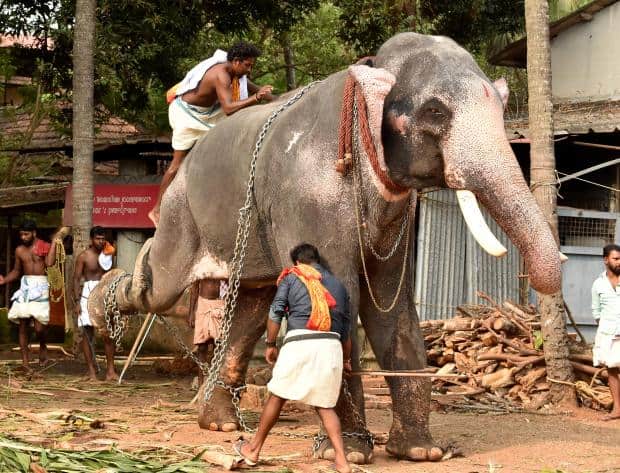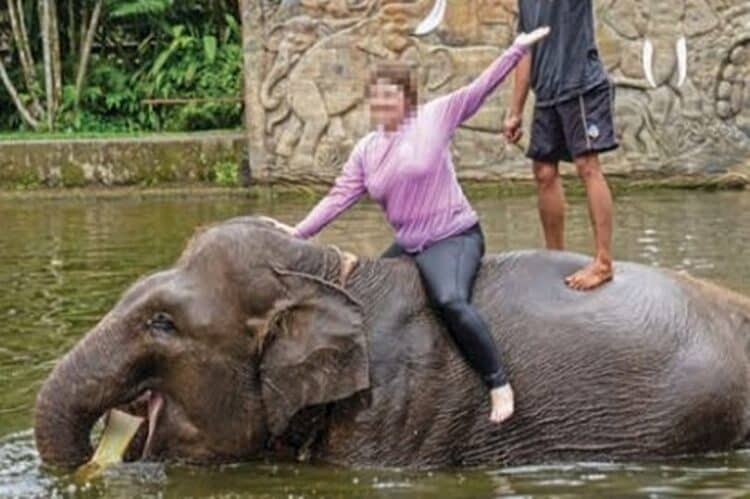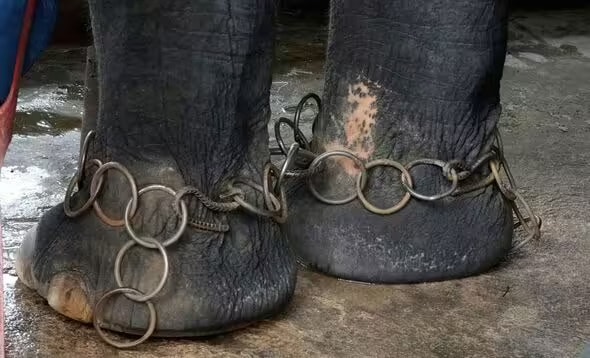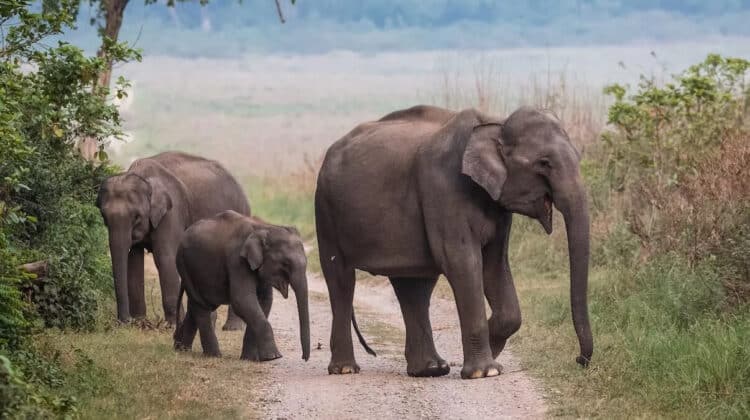STANDING in the fierce heat, with chains cutting into his flesh, Arthur’s only source of water is too far away to reach. But even if he was closer, the desperately thirsty elephant would not dare move.
If he did, he would receive a vicious beating from the man standing beside him brandishing an ankush, a fearsome wooden stick topped with a sharp metal hook. Exhausted and stressed, Arthur sways his head from side to side — looking to the passing tourists as if they can come to his rescue.

But when a group stops to take a look, all they do is pose for selfies. The Sun is in India on a mission to uncover the suffering of elephants which are beaten, broken and chained up for decades to pull in tourists.
With us is Harry Potter actress Evanna Lynch, who admits that until recently she would have been one of those travellers happily snapping pictures for an exotic Instagram post.
The 26-year-old, who played Luna Lovegood in the wizard movies, said: “Just a few years ago I dreamed of going to India and riding an elephant. But then I couldn’t have imagined the abuse the elephants suffer.
“Now I know, and I think everyone else needs to see this and know too.” Arthur is one of 50 elephants kept in pain and terror at an “elephant temple” in Guruvayur, in Kerala, South India.
It is a popular destination for thousands of the more than 850,000 Brits who visit India each year. Evanna, who is also an avid animal rights campaigner, continued: “I have been so shocked. We saw one elephant chained up — it couldn’t move at all.
“It had a stick resting on its head so if it moved the stick would fall. If it did the trainer would give it a beating.
“I asked the man standing there how long the elephant might have been there, and he told me probably his whole life. That is unfathomable.”
India’s elephants are snatched from their mothers in the wild when they are babies and taken to secret “training camps”. Here they are beaten, starved and tortured into complete submission in a process called “pajan”.



The first step is for the beasts to be forced into a kraal or “crushing cage”. This is a wooden structure designed to keep the elephant so tightly caged it cannot move — not even to turn around, nod its head or sit down.
Trainers then starve the animal and keep it awake for days on end. Exhausted and on the brink of death, the elephants are then beaten with wooden weapons, specially designed to inflict as much pain as possible.
This happens every day for at least six months, but can go on for years. When finally their spirit is so broken that they let their trainers ride them, they are deemed safe enough to be rented out or sold to tourist attractions and temples across India.
Nearly half of the elephants die from this abuse, and of those who survive to be sold, another ten per cent die within a year due to stress. But their suffering is a tourism goldmine.




The first step is for the beasts to be forced into a kraal or “crushing cage”. This is a wooden structure designed to keep the elephant so tightly caged it cannot move — not even to turn around, nod its head or sit down.
Trainers then starve the animal and keep it awake for days on end. Exhausted and on the brink of death, the elephants are then beaten with wooden weapons, specially designed to inflict as much pain as possible.
This happens every day for at least six months, but can go on for years. When finally their spirit is so broken that they let their trainers ride them, they are deemed safe enough to be rented out or sold to tourist attractions and temples across India.
Nearly half of the elephants die from this abuse, and of those who survive to be sold, another ten per cent die within a year due to stress. But their suffering is a tourism goldmine.
Elephants can be rented out for rides, festivals or to temples for anything from £34 to £1,600 a day — in a country where the average labourer only makes £10 a day. While much of the most violent training takes place out of sight of tourists, the brutal reality of elephants’ lives is far from hidden.


When we arrive at Kerala’s Kochi airport a giant elephant statue welcomes us, complete with chains around its feet. Within half an hour of being on the road we are overtaken on a motorway by a rusty truck carrying an elephant tied down by chains, wires and rope. Seconds later another passes.
They are being transported from camps across the country to one of India’s famous elephant festivals, Thrissur Pooram, in Thrissur, Kerala.
We are on our way to the same event, where we find more than 90 elephants have been shipped in. They are dressed up and forced to stand in front of huge crowds while cannons fire and drums are banged for hours.
With the help of our guide we gain access to a backstage holding pen for the animals, out of sight of visitors. In this dark, corrugated-iron structure the animals are heavily chained, unable to move or access water. Each has at least one trainer guarding it with sticks, and every animal looks terrified.
Many have gaping wounds on their feet and backs — not a problem for the trainers who simply paint the wounds grey to cover up the injuries from the tourists.

In order to discover more about what these beasts have been through, Evanna and I travel two hours north into deep forest to the village of Kodanad, where our guide tells us there is a training camp. After some careful negotiations with guards we manage to enter, posing as tourists who “just want to see the elephants”. Inside we see the terrible, stark reality of their lives.
Chained to tree stumps, they are in appalling condition. Autoor is 16 years old and we find her swaying her head from side to side, over and over again — a sign of huge distress.
It is impossible not to want to comfort her, but before we get too close a trainer approaches and whacks her with a stick, she immediately stops swaying, instead standing completely still.
We quickly move on until we find a clearing in the forest. It is here we find the saddest of sights — a lone elephant locked in a crushing cage.
The wooden cell stands so tall at first it is almost impossible to make out the elephant stuck inside. Then the trainers arrive and begin hitting and stabbing the elephant through the cage with large sticks.

It is too much to bear and, with our guide getting increasingly anxious about our pictures being discovered, we quickly leave. I ask our guide, is this how all elephants are trained, or are some tamed more humanely?
His response is chilling: “This is every single tourist elephant’s fate. The only reason they obey is with fear. They have been broken.”
Duncan McNair, founder of charity Save The Asian Elephants (STAE),who was on the undercover trip to India, is campaigning for a law banning UK holiday firms and tour companies advertising trips for these sorts of encounters with animals.
He says: “Elephants are some of the most intelligent, emotional creatures in the world and the abuse they suffer is unimaginable. “Those horrors ensure the rest of their life is lived in fear.
“I’m confident that if any tourist ever saw this, or even a small aspect of it, they would be appalled.” With tears in her eyes, Evanna said: “When people who have ridden elephants in the past or visited these places see this article, I don’t want them to feel guilty — they were misled by the irresponsible tourist industry.

This article was first published by The Sun.
What you can do
Support ‘Fighting for Wildlife’ by donating as little as $1 – It only takes a minute. Thank you.







Leave a Reply